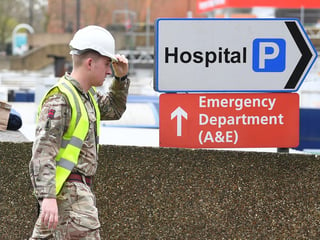Senior lawyers brand emergency virus laws 'a sinister attack on justice'
Radical measures being introduced will include the suspension of jury trials, a six-month extension on the time limit for cases to get under way and a relaxation of the evidence rules in some cases.
It could also result in some prisoners being freed to ease the pressure on jails during the pandemic, as part of the provisions of the Coronavirus (Scotland) Bill. The Scottish Government insists the measures are needed to
Advertisement
Hide AdAdvertisement
Hide Adensure the smooth running of the justice system. It is backed by Scotland’s most senior judge, Lord Carloway, who warned the judiciary is facing a backlog of up to 1,000 trials as a result of the pandemic.


But the Tories announced last night they will seek to amend the emergency laws to retain jury trials.
The legislation is expected to be passed today and will include measures to bar evictions during the pandemic and cut red tape for councils.
Warnings
But it is the changes to the criminal justice system that have provoked controversy, with the Scottish Criminal Bar Association, the elite group of the country’s leading lawyers, warning the emergency laws go too far.
“What is proposed includes attacks on principles that have been built over more than 600 years and are the very cornerstone of not just Scotland’s criminal justice system, but those of almost every advanced liberal democracy in the developed world,” the association warned.
“These measures are premature, disproportionate and ill-advised. They are at best a knee-jerk reaction to an as yet unquantified problem instigated by panic, and at worst something far more sinister.”
The association, which is affiliated to the Faculty of Advocates, said that England, which conducts far more criminal trials, had so far not announced any plans to suspend jury trials. The body said no such move to dispense with juries was implemented even during the two world wars.
“To allow these proposals would result in summary trials being conducted in the High Court of Justiciary in all but name, and would amount to no more than justice on the cheap,” the association said.
Advertisement
Hide AdAdvertisement
Hide AdMinisters were concerned the amount of time 15 jurors would normally spend sitting beside each other in court and then placed together in the jury room to deliberate on a verdict would breach social distancing safeguards.
The blanket six-month extension of time limits in bringing cases to court would take it from 110 days to 293 days, more than doubling the current limits.
The relaxation in evidence centres on the exception to rules barring “hearsay” evidence, which is not presented in court under oath. It would mean such evidence could be allowed where someone is suffering from coronavirus.
Laws ‘are last resort’
First Minister Nicola Sturgeon said the suspension of jury trials was needed so that serious criminal trials could still go ahead in some form.Ms Sturgeon said: “We are not deaf or blind to the concerns around these powers.
“We would never have wanted to be in a position to pass legislation like this. We wouldn’t be doing it unless we thought it was necessary for the protection of the population.”
The powers had been sought by Lord Carloway, the Lord President and Scotland’s top judge, in order to keep the courts operating during the current crisis. He warned of a “monumental” backlog in solemn criminal trials.
“These are likely to stretch into years rather than months,” he said.
“The delays will be unprecedented in Scottish legal history. The scale of the potential backlog is very daunting. At a conservative estimate, the backlog will be over 1,000 trials on the optimistic assumption that the restrictions are lifted by the start of summer.
Advertisement
Hide AdAdvertisement
Hide Ad“Anything that can be done, therefore, to address the forthcoming backlog will help avert a critical logjam in the system in the period of recovery once restrictions are lifted.”Constitution secretary Michael Russell said the powers would be strictly time-limited, and could only last for a maximum of 18 months with Holyrood’s approval, and were also subject to two-monthly reports to the Scottish
Parliament. “We want to keep people safe,” he said. But the Scottish Conservatives will seek to amend the new laws today.
Tory MSP Murdo Fraser said: “Trial by jury for serious criminal cases has been part of the Scottish justice system for hundreds of years. It is an important safeguard of human rights, which we would be most reluctant to see removed.”
The bill will be passed as emergency legislation today, also allowing for inmates to be freed before the end of their sentences if it is deemed to be a “necessary and proportionate response to the effects of coronavirus on a prison or prisons”.
Ms Sturgeon said this would only be used as a “last resort”.
She said: “As is the case with many of these powers, they are there as a contingency, so we have them should we need them.
“This is not something we will do lightly and hopefully we will not require to do at all.”
Mr Russell said prisoners serving a life sentence, or anyone convicted of terrorism or sexual crimes, would not be allowed early release.
Advertisement
Hide AdAdvertisement
Hide AdHe said regulations would have to be approved by MSPs for an early release to take place. The legislation will also see other adjustments to criminal procedure, family law and civil justice to allow hearings to take place remotely.
Across the public sector, there are changes to the deadlines involved in planning and local authority licensing to reflect the fact that much of that business has been suspended and construction slowed due to Covid-19. To protect private and social sector tenants from eviction, the minimum notice period for tenants is being increased to up to six months, giving people peace of mind.
Further emergency legislation is likely to be published in coming weeks, Mr Russell added. The emergency legislation is renewable only twice at six monthly intervals, but Mr Russell said this would not happen unless it is needed.
A message from the Editor:Thank you for reading this story on our website. While I have your attention, I also have an important request to make of you.With the coronavirus lockdown having a major impact on many of our advertisers - and consequently the revenue we receive - we are more reliant than ever on you taking out a digital subscription.Subscribe to scotsman.com and enjoy unlimited access to Scottish news and information online and on our app. With a digital subscription, you can read more than 5 articles, see fewer ads, enjoy faster load times, and get access to exclusive newsletters and content. Visit https://www.scotsman.com/subscriptions now to sign up.
Our journalism costs money and we rely on advertising, print and digital revenues to help to support them. By supporting us, we are able to support you in providing trusted, fact-checked content for this website.
Frank O'Donnell
Editorial Director
